Work-life Balance
Work-life balance refers to the equilibrium and harmony between one's professional commitments (work) and personal life (family, social activities, hobbies, and personal well-being).
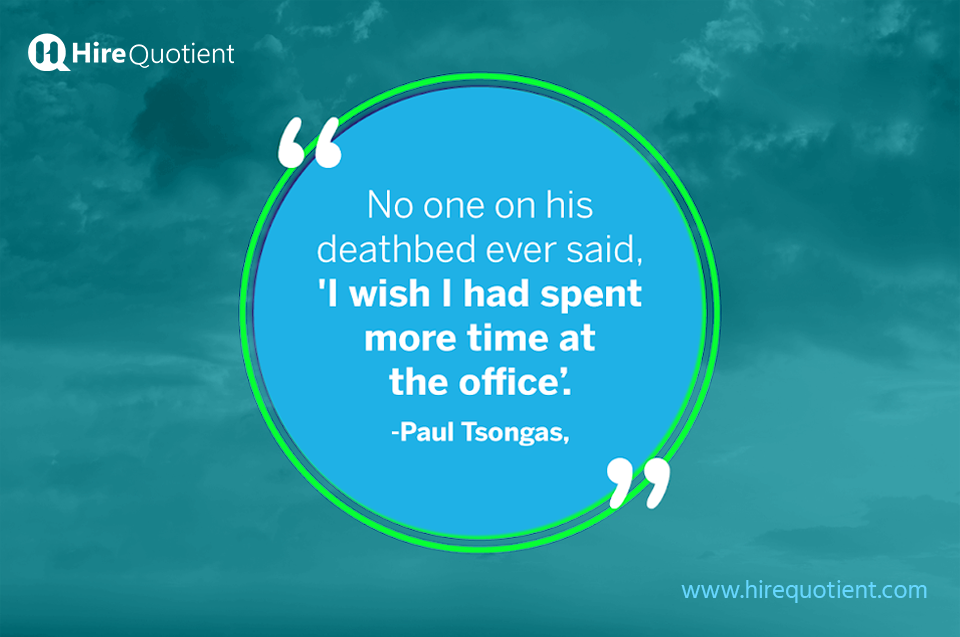
Rewind to the pre-covid era in 2019, the work-life balance of employees looked significantly different compared to today. It was evident that work-life balance was poorly managed, as statistics indicated:
- Approximately 26% of employees were taking work home, leading them to complete tasks during evenings or weekends.
- An alarming 40% of the workforce continued working after 10 pm, indicating excessive working hours.
- A mere 8 hours were spent on productive tasks, pointing towards potential inefficiencies and burnout.
Fast forward to the present, with the widespread adoption of remote work, such as work from home (WFH) and work from anywhere (WFA) arrangements, the work-life balance has undergone a transformation. While some employees have experienced an improvement, others might still struggle with maintaining a healthy balance.
Understanding the evolution of work-life balance in recent years is crucial, given its paramount importance for both employees and employers alike. A healthy work-life balance directly influences employee well-being, job satisfaction, productivity, and overall mental health. It has become a crucial factor in retaining top talent and fostering a positive work culture.
Let us understand how work-life balance has changed in the recent years, why it is important and how you as an employer can give a great work-life balance to your employees.
Work-Life Balance Meaning
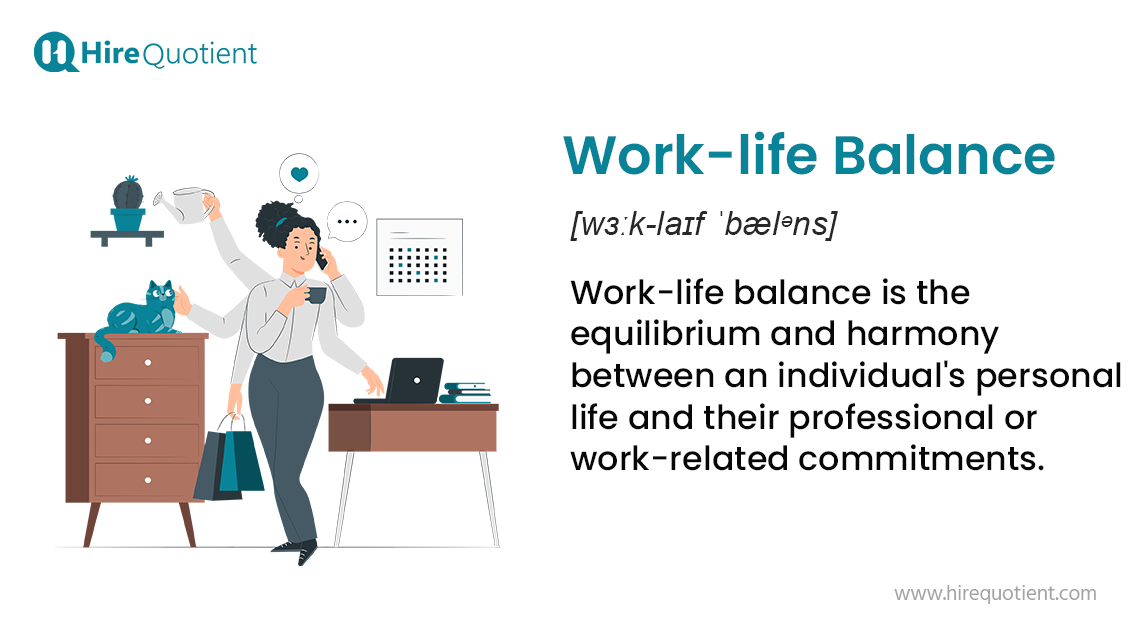
Work-life balance refers to the equilibrium and harmony between an individual's personal life and their professional or work-related commitments. It is the ability to effectively manage and allocate time and energy to various aspects of life, including work, family, social activities, hobbies, and personal well-being. Achieving a healthy work-life balance is essential for overall well-being, job satisfaction, and maintaining a fulfilling lifestyle.
When someone has a good work-life balance, they can strike a suitable blend between their work responsibilities and personal life, avoiding excessive stress, burnout, or neglecting important aspects of their life outside of work. It involves setting boundaries, managing time efficiently, and recognizing the importance of dedicating time to both professional and personal pursuits.
Importance Of Work-Life Balance
Work-life balance is not just some fancy catchphrase; it's a fundamental aspect of our lives that can make a world of difference!
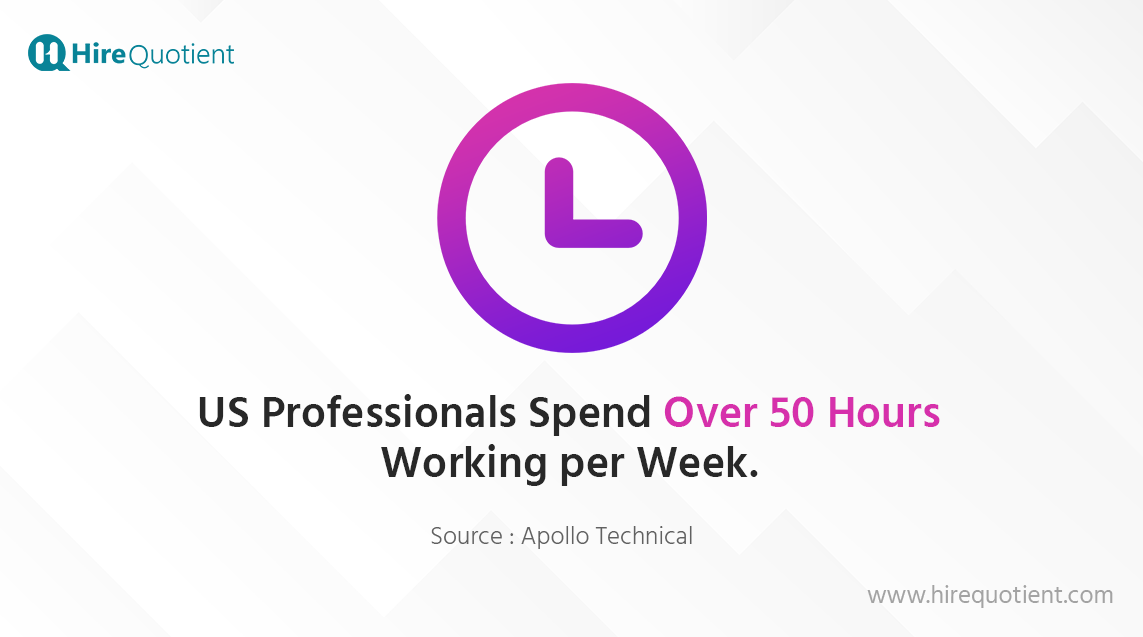
However, the ideal work week is 40 hours. Most Americans spend more than 8 hours per day working and end up giving more than 50 hours a week to their work.
Think about it this way: we all have different parts to our lives, like work, family, friends, and personal stuff. Finding the right balance among all these things is like trying to get the perfect recipe for happiness.
So, why is work-life balance so important? Let me break it down for you:
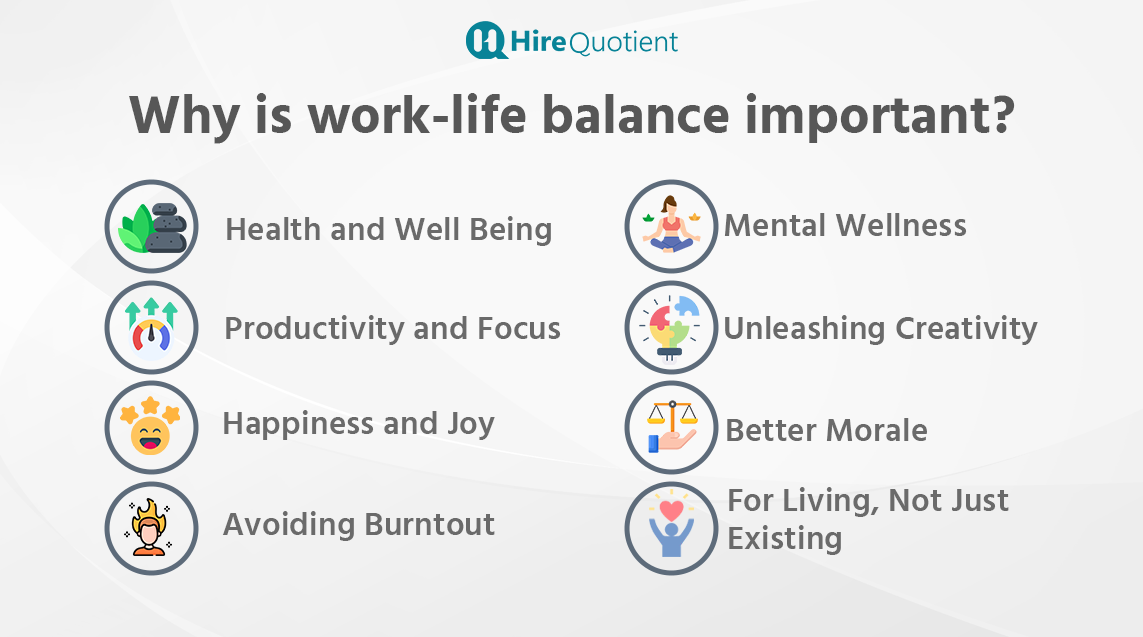
- Health and Well-being: When you're constantly burning the candle at both ends, stress starts creeping in like an unwelcome guest. But with a good work-life balance, you can manage stress better, stay healthier, and keep both your mind and body in top shape.
- Productivity and Focus: Ever tried to concentrate on work when your mind is wandering off to your family or other personal matters? It's tough! But when you've got that work-life balance sorted, you'll be amazed at how much more focused and productive you become.
- Happy, Happy, Joy, Joy: Who doesn't want to be happier, right? When you strike that balance, you get to enjoy the best of both worlds – the satisfaction of a fulfilling career and the joy of spending quality time with your loved ones.
- Avoiding Burnout: Picture this: working like a machine non-stop until you break down. No fun, right? A proper work-life balance acts as your shield against burnout, helping you recharge and come back stronger.
- Relationships that Thrive: Neglecting your personal life for work can strain your relationships like an old pair of shoes. But when you give ample time and attention to your loved ones, those relationships flourish.
- Retaining Top Talent: Now, listen up, employers! Offering a work-life balance isn't just a nice thing to do; it's a smart business move. Happy employees stick around, and that means less turnover and more loyalty.
- Unleash Creativity: When your life isn't all about work, your creative juices flow like a river! Engaging in hobbies and passions outside of work can spark innovation and fresh ideas.
- Live, Not Just Exist: Life is too short to spend it solely behind a desk. With a good work-life balance, you can actually live life, create memories, and have experiences that make it all worthwhile.
What is a good work-life balance?
A good work-life balance is all about finding the right mix and harmony between your professional responsibilities and your personal life. It's about ensuring that neither aspect dominates the other and that you have time and energy for both work and non-work activities that matter to you. Here's what a good work-life balance might look like:
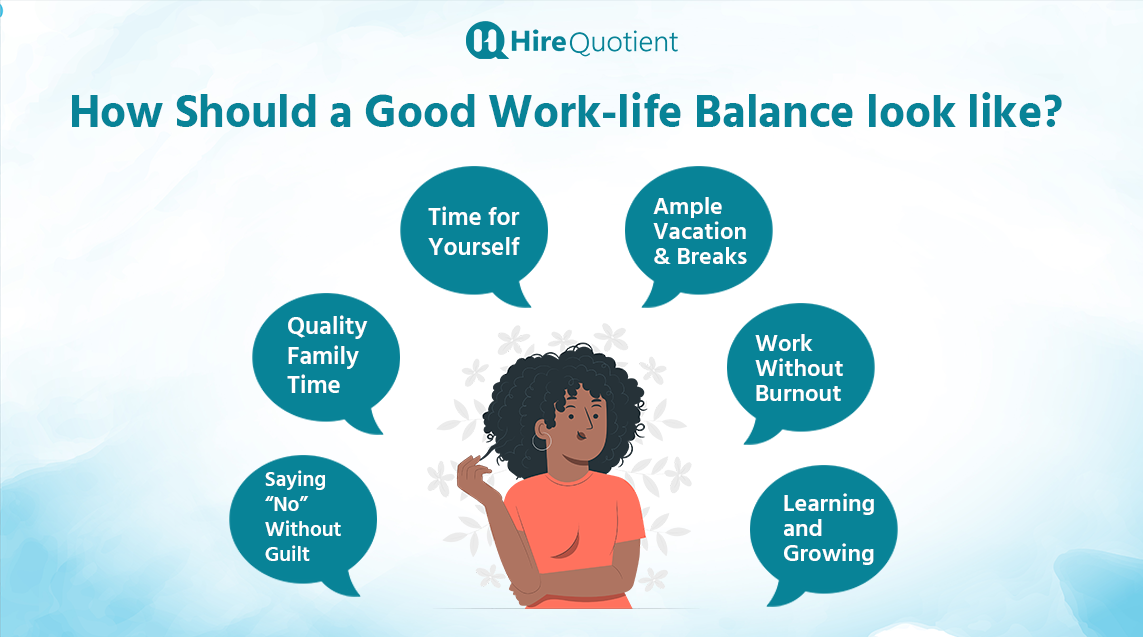
- Time for Personal Life: You have enough time to spend with your family, friends, and loved ones, and you can engage in activities that bring you joy and fulfillment outside of work.
- Manageable Work Hours: Your work hours are reasonable and allow you to meet your job's demands without consistently overworking or feeling overwhelmed.
- Flexibility: You have some level of flexibility in your work schedule, which allows you to attend to personal commitments or emergencies without significant stress.
- Limited Overtime: While occasional overtime might be necessary, it doesn't become the norm. You can complete your tasks within regular working hours most of the time.
- Vacation and Breaks: You can take vacations and breaks without feeling guilty or fearing repercussions, knowing that your work will be managed well in your absence.
- Physical and Mental Well-being: You prioritize your health and well-being by getting enough sleep, exercising, and managing stress effectively.
- Minimal Work Interference: Your work commitments don't regularly interfere with your personal life, allowing you to be present and enjoy your time off.
- Clear Boundaries: You've set clear boundaries between work and personal life, and you can disconnect from work when you're off the clock.
- Job Satisfaction: You feel satisfied and fulfilled with your job, and it doesn't negatively impact your overall happiness.
- Pursuing Hobbies and Interests: You have time to engage in hobbies, interests, or personal projects that you're passionate about.
Signs of a Poor Work-Life Balance
Recognizing the signs of a poor work-life balance is crucial because it helps you identify when things are getting out of hand and need attention. Here are some common signs that indicate you might be struggling with an unhealthy work-life balance:
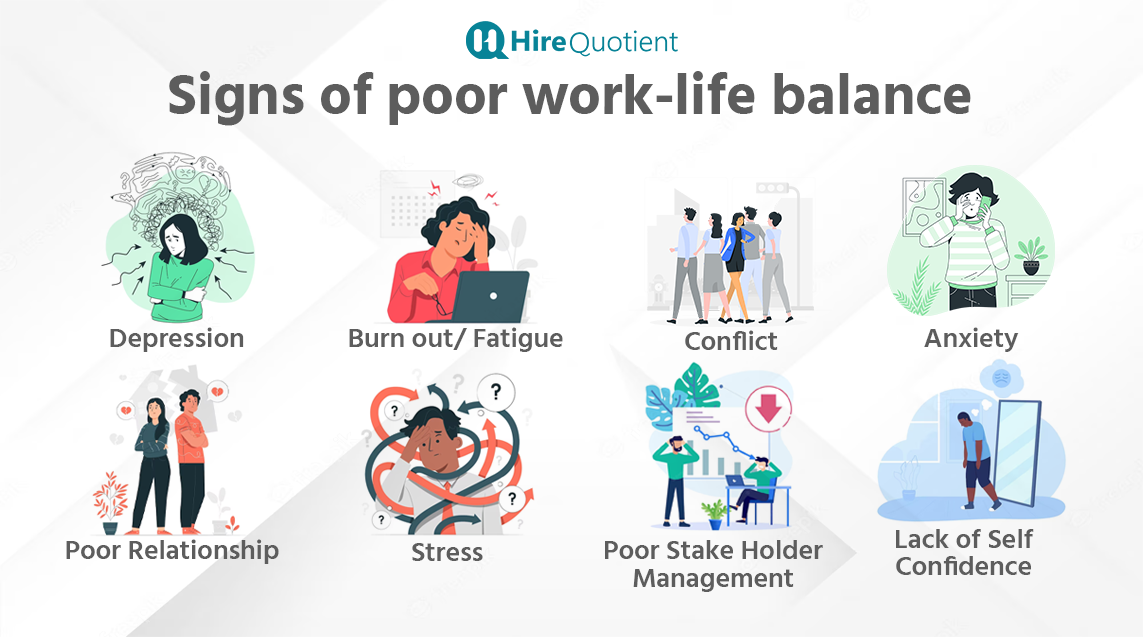
- Constantly Feeling Overwhelmed: You feel like you're drowning in tasks, and there's just no breathing room. Work seems to spill into every nook and cranny of your life.
- No Time for Yourself: Your "me-time" has become an endangered species. There's barely any time left for hobbies, relaxation, or doing things you love.
- Neglecting Health: Your health takes a backseat as stress piles up. Exercise and proper nutrition seem like a distant memory.
- Disappearing Social Life: Your friends and family have started sending out search parties to find you because you're never available for outings or gatherings.
- No Boundaries: Work follows you everywhere, invading your evenings, weekends, and even vacations.
- Sleep? What's That?: Getting a good night's sleep feels like a luxury, as work-related thoughts keep you tossing and turning.
- Emotional Rollercoaster: Your emotions are all over the place – from stress and frustration to guilt for not being present in your personal life.
- Declining Productivity: Oddly enough, the harder you work, the less productive you become. Your efficiency takes a nosedive.
- Feeling Stuck: You feel trapped in a cycle of never-ending work, with no time to pursue your dreams or passions.
Benefits of Maintaining Work-Life Balance
Maintaining a healthy work-life balance doesn't just benefit employees; it's a win-win situation for employers as well. Here are some compelling advantages of maintaining a healthy work-life balance for organizations:
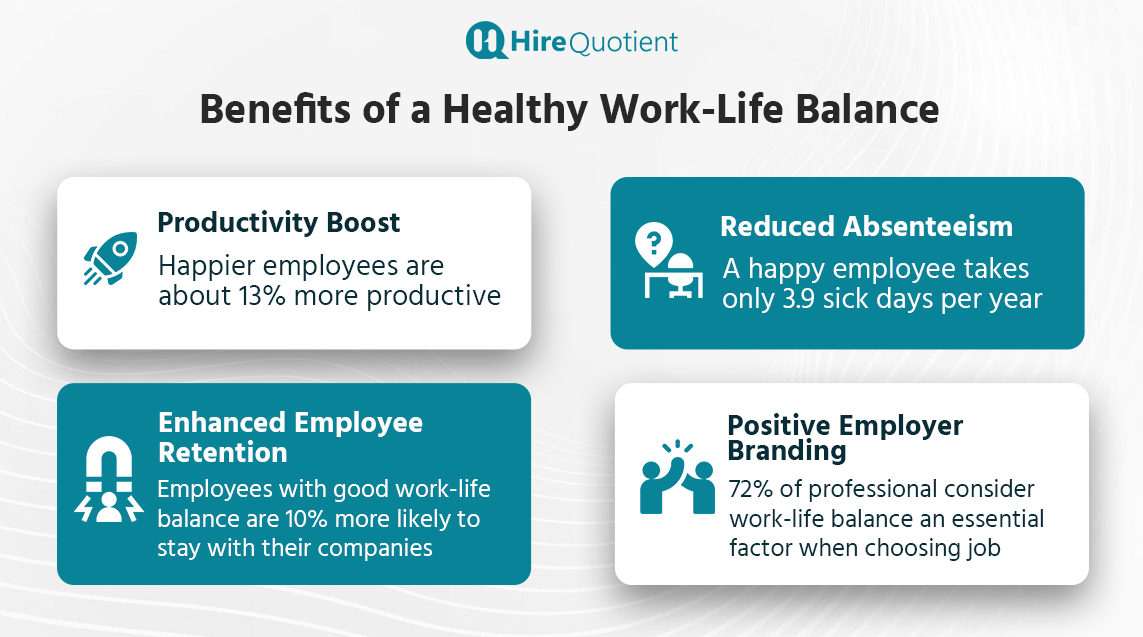
- Boosted Productivity: When your employees have a healthy work-life balance, they're like energizer bunnies—always charged up and ready to go. In fact, a study by the Oxford University's Saïd Business School found that happier employees are about 13% more productive!
- Reduced Absenteeism: Forget the Monday blues! Maintaining a good work-life balance reduces employee burnout and stress, leading to a drop in absenteeism. In fact, a survey by Gallup revealed that engaged employees take an average of 3.9 sick days per year, compared to disengaged employees taking 6.2 days.
- Enhanced Employee Retention: You know the headache of hiring and training new talent? Well, a balanced work-life equation can make it less of a migraine. Research from the Harvard Business Review shows that employees who believe they have good work-life balance are 10% more likely to stay with their companies.
- Positive Employer Branding: You want your company to shine like a superstar in the job market, right? Well, promoting work-life balance can give you that glow. A survey by Statista revealed that 72% of professionals consider work-life balance an essential factor when choosing a job.
Work-Life Balance Quotes
- "Balance is not something you find, it's something you create." - Jana Kingsford
- "It's not the load that breaks you down, it's the way you carry it." - Lou Holtz
- "Happiness is not a matter of intensity, but of balance, order, rhythm, and harmony." - Thomas Merton
- "The key to work-life balance is to focus on the things that really matter." - Stephen Covey
- "A well-balanced person is one who finds both sides of an issue laughable." - Herbert Procknow
- "Balance is the key to everything. What we do, think, say, eat, feel, they all require awareness and through this awareness, we can grow." - Koi Fresco
- "It's all about quality of life and finding a happy balance between work and friends and family." - Philip Green
- "Work-life balance means being able to switch off from work when you're at home, and switch off from home when you're at work." - Catherine Pulsifer
Work-Life Balance Examples
Several organizations have taken initiatives to promote and maintain work-life balance for their employees. Here are some examples of companies known for their efforts in this area:
- Microsoft: Microsoft is renowned for its focus on work-life balance and offers various flexible work arrangements, including remote work options. The company emphasizes employee well-being, providing resources like mental health support and wellness programs.
- Salesforce: Salesforce is committed to creating a healthy work environment for its employees. They offer flexible work hours, unlimited paid time off, and wellness benefits, encouraging employees to prioritize their personal lives.
- Google: Google is known for its progressive workplace policies, promoting a healthy work-life balance. The company provides on-site amenities, such as gyms and recreational areas, and offers various wellness programs for its employees.
- Patagonia: Patagonia is a pioneer in work-life balance initiatives. They offer flexible work hours, encourage employees to pursue their outdoor passions, and even support environmental causes through paid volunteer time.
How To Improve Work-Life Balance? - Innovative Ideas for Employers
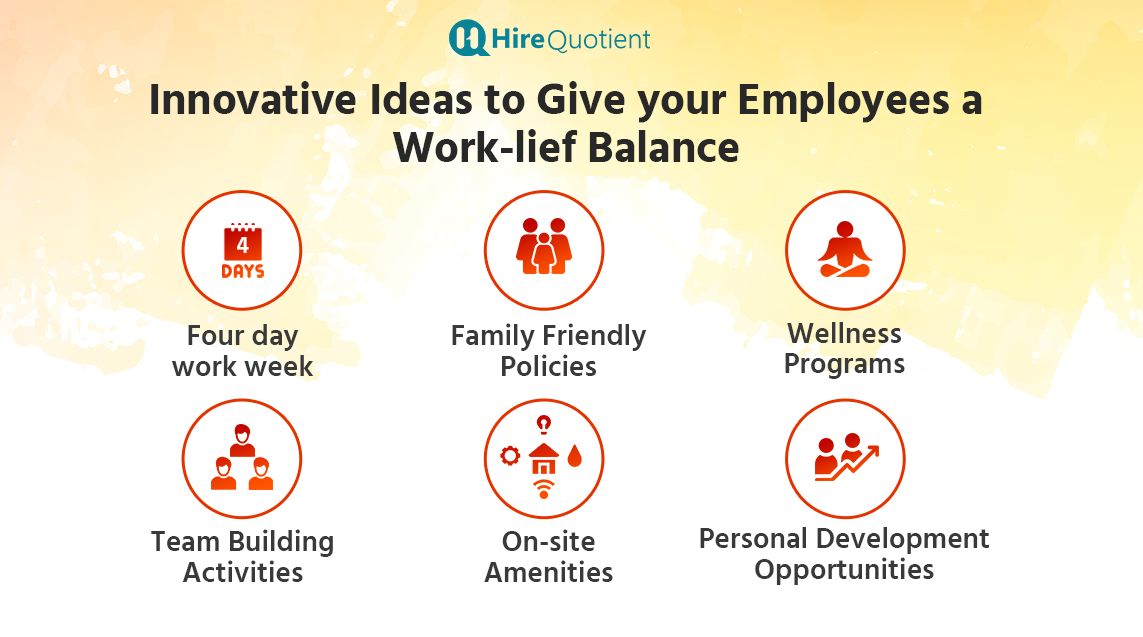
Improving work-life balance for employees requires creativity and a genuine commitment from employers. Here are some innovative ideas that can help foster a healthier work-life balance:
- Flexible Work Arrangements: Offer flexible work hours or allow employees to work remotely. Embracing a results-oriented approach instead of strict working hours can empower employees to manage their time effectively.
- Four-Day Workweek: Consider implementing a four-day workweek, allowing employees to have a three-day weekend. This compressed schedule can boost morale and productivity.
- Wellness Programs: Invest in comprehensive wellness programs that focus on physical and mental health. Offer fitness classes, meditation sessions, and workshops on stress management.
- Unlimited Paid Time Off: Offer employees unlimited paid time off (within reasonable limits) to give them more control over their vacation time and personal commitments.
- Personal Development Opportunities: Encourage employees to pursue personal development interests during work hours, such as attending workshops or courses related to their hobbies.
- Paid Volunteer Time: Provide paid time off for employees to engage in volunteer work or community service. It allows them to contribute to causes they care about while fostering a sense of fulfillment.
- On-Site Amenities: Create on-site amenities like gyms, relaxation areas, or childcare facilities, making it more convenient for employees to manage personal and work responsibilities.
- Technology for Time Management: Provide employees with time management and productivity tools that can help them efficiently organize their work and personal tasks.
- Family-Friendly Policies: Implement family-friendly policies, such as extended parental leave, flexible return-to-work options after parental leave, and support for new parents.
- Work-Life Integration: Encourage work-life integration rather than strict separation. For example, allow parents to attend school events during work hours without penalty.
- Mental Health Support: Offer mental health resources and counseling services to employees, promoting a healthy work environment.
- No-Meeting Days: Designate specific days where no internal meetings are scheduled to allow employees uninterrupted focus time.
- Team Building Activities: Organize team-building activities outside of work hours to promote a sense of camaraderie and foster positive relationships.
- Remote Work Retreats: Plan occasional remote work retreats where teams can work together in a different setting while still having leisure time to bond and relax.
- Peer Recognition Programs: Implement peer recognition programs to acknowledge employees' efforts and contributions, creating a positive and supportive workplace culture.
Work-Life Balance Problems And Solutions
Work-life balance problems are common challenges that many employees face in their professional and personal lives. Let's explore some of these issues and potential solutions:
Problem 1: Overworking and Burnout
Employees may feel pressured to work long hours or take on excessive workloads, leading to burnout and reduced productivity.
Solution: Encourage time management and prioritize tasks. Implement policies that discourage working beyond regular hours and promote work-life boundaries. Provide resources and support for stress management and mental well-being.
Problem 2: Lack of Flexible Work Options
Employees may struggle to balance personal commitments due to inflexible work schedules.
Solution: Offer flexible work arrangements, such as remote work options or flexible hours, allowing employees to better manage their personal responsibilities while still fulfilling their work duties.
Problem 3: Technology Overload
Constant connectivity and digital distractions may make it difficult for employees to disconnect from work.
Solution: Encourage employees to set specific boundaries for work-related communications outside of working hours. Implement "email-free" or "quiet hours" to create dedicated time for personal and family life.
Problem 4: Limited Vacation and Time Off
Employees may feel hesitant to take time off due to heavy workloads or perceived lack of support.
Solution: Encourage employees to take regular vacations and promote a culture that values rest and rejuvenation. Implement policies such as unlimited paid time off or compulsory vacation days to ensure employees take time off.
Problem 5: Insufficient Workload Distribution
Uneven distribution of work can lead to some employees feeling overwhelmed while others have lighter workloads.
Solution: Regularly assess workloads and redistribute tasks evenly among team members. Encourage open communication to identify and address workload concerns.
Problem 6: Unclear Expectations
Employees may be uncertain about expectations regarding work hours and availability.
Solution: Clearly communicate work-related expectations, including response times for emails and availability outside of regular working hours. Set realistic deadlines and avoid last-minute urgent requests.
Problem 7: Lack of Supportive Work Culture
A workplace culture that doesn't prioritize work-life balance can contribute to employee dissatisfaction.
Solution: Foster a supportive work culture that encourages work-life balance. Lead by example as employers, demonstrating the importance of maintaining balance in their own lives.
How To Achieve Work-Life Balance? - Tips for Employees
Achieving work-life balance is a journey that requires conscious effort and self-awareness. Here are some unique tips for employees to find that elusive equilibrium:
- Set Clear Boundaries: Define specific work hours and personal time. Avoid checking work emails or taking calls during personal hours to maintain a healthy separation.
- Prioritize Personal Time: Schedule personal activities and hobbies just like you would with work tasks. Treat your personal time as non-negotiable and equally important.
- Use Technology Wisely: Leverage technology to your advantage. Use productivity apps to manage tasks efficiently, set reminders for breaks, and even block distracting websites during work hours.
- Focus on One Thing at a Time: Embrace the power of focus. Multitasking can lead to increased stress and decreased productivity. Concentrate on one task at a time and give it your full attention.
- Delegate and Collaborate: Don't be afraid to ask for help or delegate tasks at work. Collaborate with colleagues to share the workload and create a supportive work environment.
- Learn to Say No: Respectfully decline additional work or commitments that could overload your schedule. Saying no doesn't mean you're uncooperative—it means you value your time and well-being.
- Unplug Regularly: Dedicate specific time each day or week to unplug from digital devices and social media. Use this time to relax, meditate, or engage in activities that recharge you.
- Plan Your Week Ahead: Outline your tasks and goals for the week, including personal activities. This proactive approach helps you manage time effectively and reduces last-minute stress.
- Establish a Relaxing Pre-Bedtime Routine: Create a calming routine before bedtime to transition from work mode to a relaxed state, promoting better sleep and reducing work-related thoughts.
- Communicate with Your Employer: If you're struggling with work-life balance, have an open conversation with your employer. Discuss the possibility of flexible work arrangements or adjustments to your workload.
- Learn New Skills: Enhance your time management and organization skills. Attend workshops or read books that offer practical tips to help you manage both work and personal life effectively.
- Practice Mindfulness: Be present in the moment, both at work and in your personal life. Mindfulness can help reduce stress, improve focus, and enhance overall well-being.
- Celebrate Small Wins: Acknowledge your achievements, no matter how small. Celebrating milestones boosts motivation and positivity.
- Take Micro Breaks: Incorporate short breaks throughout your workday to stretch, breathe, or take a walk. These micro breaks can refresh your mind and boost productivity.
- Avoid Comparisons: Focus on your own journey towards work-life balance. Avoid comparing yourself to others, as everyone's circumstances and priorities are unique.
Overall,
achieving work-life balance is not just a personal responsibility; it's a shared endeavor that requires active participation from employers. By recognizing the importance of work-life balance and taking proactive steps to support their employees' well-being, employers can foster a positive and thriving work environment.
When employers prioritize work-life balance, they reap the rewards of a more engaged, productive, and loyal workforce. A harmonious balance between work and personal life not only enhances individual happiness and job satisfaction but also contributes to the overall success and prosperity of the organization.